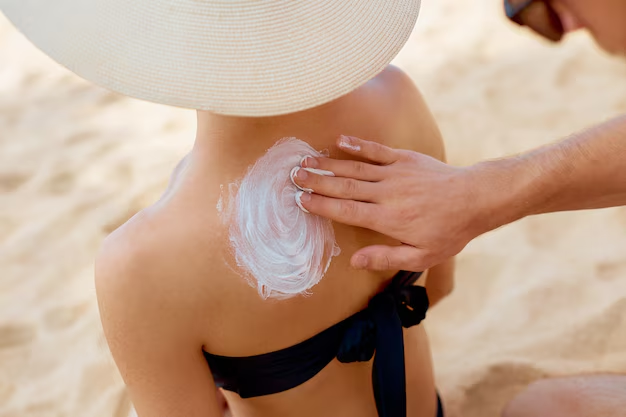Unmasking Sunscreen Myths: Is Your Sun Blocker Doing More Harm Than Good?
Imagine a sunny day at the beach. Umbrellas scattered like polka dots on the sand, the rhythmic sound of waves, and the gentle warmth of the sun kissing your skin. It's a perfect day, but the fear of sunburn and the admonition to protect your skin can cast a shadow over such bliss. As you reach for that bottle of sunscreen, a question lingers—could this very shield against the sun potentially harbor hidden dangers? Specifically, does sunscreen cause cancer? Let's dive deep and unravel this intricate health query by examining the facts, exploring related concerns, and empowering you with practical insight.
Understanding Sunscreen and Its Purpose
What is Sunscreen?
Sunscreen, a common staple in skincare, is designed to act as a barrier against the harmful effects of ultraviolet (UV) rays from the sun. There are two main types:
- Chemical Sunscreens: These contain organic compounds that absorb UV radiation and dissipate it as heat.
- Physical (or Mineral) Sunscreens: Containing inorganic compounds like zinc oxide or titanium dioxide, these products reflect and scatter UV radiation.
How Does Sunscreen Protect Your Skin?
UV rays include UVA and UVB rays, both of which can cause skin damage, premature aging, and increase the risk of skin cancer. Sunscreens are formulated to prevent these rays from penetrating the skin, thereby reducing potential damage.
The Cancer Connection: Fact or Fiction?
Does Sunscreen Cause Cancer?
This question has sparked debate, primarily due to concerns over certain ingredients in chemical sunscreens. However, there is no conclusive scientific evidence to support the claim that sunscreen itself causes cancer. The concern often arises from misunderstandings about specific ingredients, which we'll explore below.
Common Concerns and Ingredients in Question
Oxybenzone: A frequent topic of discussion, oxybenzone is criticized for its potential to disrupt hormones. However, studies have not conclusively proven that it poses a cancer risk to humans.
Retinyl Palmitate: Some animal studies have suggested that this vitamin A derivative might accelerate tumor growth when exposed to sunlight. However, these findings lack clarity when translated to everyday sunscreen use by humans.
Nano-sized Particles: Mineral sunscreens may use nano-sized zinc oxide or titanium dioxide for better application. Concerns mainly revolve around these being inhaled (via sprays), though they are generally considered safe when applied to the skin.
Safety and Sunscreen: FDA and Global Guidelines
The Food and Drug Administration (FDA) continuously evaluates the safety of sunscreen ingredients. As of now, they emphasize the importance of protection against UV rays and recommend using sunscreens as directed. Globally, other health organizations like the World Health Organization (WHO) promote sunscreen use alongside other sun-safe practices.
Weighing the Risks and Benefits
The Benefits of Sunscreen
- Prevents Sunburn: Immediate protection against painful sunburns.
- Reduces Risk of Skin Cancer: Regular use of sunscreen has been shown to lower the incidence of squamous cell carcinoma and melanoma, the latter being the deadliest form of skin cancer.
- Prevents Premature Aging: Shields the skin from photoaging, helping maintain a youthful appearance.
The Risks of Not Using Sunscreen
- Increased UV Exposure: Without protection, UV rays dramatically increase the risk of developing skin cancer.
- Skin Damage and Aging: Unprotected skin is prone to damage, leading to wrinkles, spots, and loss of elasticity.
Navigating the World of Sunscreens: Making Informed Choices
What to Look for in a Sunscreen?
- Broad-Spectrum Coverage: Protects against both UVA and UVB rays.
- SPF 30 or Higher: SPF (Sun Protection Factor) indicates the level of protection against UVB rays.
- Water Resistance: Important for activities involving water or sweat.
Practical Tips for Safe Sun Practices
- Apply Generously and Often: Use about an ounce (a shot glass full) for the entire body, reapplying every two hours or after swimming/sweating.
- Seek Shade: Especially between 10 AM and 4 PM when the sun's rays are strongest.
- Wear Protective Clothing: Hats, sunglasses, and long sleeves offer added protection.
- Avoid Tanning Beds: These increase your risk for melanoma and other skin cancers.
Broader Health Considerations: Sunscreen and Vitamin D
Does Sunscreen Block Vitamin D Synthesis?
Vitamin D, essential for bone health, is synthesized through skin exposure to UVB rays. While sunscreen could theoretically lower production, real-world use typically only reduces it minimally. Incorporating dietary sources of vitamin D or supplementation can help maintain levels.
Balancing Sun Safety and Health
- Take Short Sun Breaks: Allow unprotected exposure for a short period at safe times of the day.
- Monitor Your Vitamin D: Check with a healthcare provider if you're concerned about levels.
Conclusion: A Shield, Not a Hazard
In essence, sunscreen remains a critical component of sun-safe practices. While potential risks related to certain ingredients warrant attention and research, the broad consensus remains that the benefits of sunscreen in preventing skin cancer and sun damage significantly outweigh these concerns.
By understanding how sunscreen works, making informed choices, and practicing comprehensive sun safety, you can enjoy those sunny days with peace of mind.
Quick Takeaways 🌞
- Use a Broad-Spectrum, SPF 30+ Sunscreen: Shields against UVA and UVB rays effectively.
- Reapply Every Two Hours: Ensures continuous protection, especially after swimming or sweating.
- Combine with Other Sun-Safe Practices: Hats, sunglasses, shade, and clothing add layers of defense.
- Choose Wisely: Being informed about ingredients helps navigate available products.
- Mind the Vitamin D: Ensure enough through food or supplements if needed.
These strategies create a balanced and informed approach to enjoying the sun safely and healthily. 🌻🌊

Related Articles
- Are Breast Cancer Lumps Painful
- Are Chills a Sign Of Cancer
- Are Colon Spasms a Sign Of Cancer
- Are Lytic Lesions Always Cancer
- Are Polyps Cancer
- Can a Blood Test Detect Cancer
- Can a Ct Scan Detect Cancer
- Can a Dexa Scan Show Cancer
- Can a Gastric Emptying Scan Show Cancer
- Can a Lung Biopsy Cause Cancer To Spread
